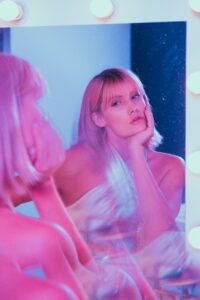Beauty is measured by glances and smiles. By Instagram followers and likes. We measure it in modeling contracts and movie screens. We put it on magazine covers as blushing brides for overeager guys in suits-and-ties. Magazine covers with shirtless, square-jawed men who are mysterious but still accessible. It is gauged by thirst levels and desire and fantasy.
As poet John Keats wrote in Ode on a Grecian Urn:
“Beauty is truth, truth beauty, —that is all. Ye know on earth, and all ye need to know.”
We don’t know what to do with it once we have it. What we lack in words we make up for in feelings. What we can’t say, we try and show. We fail at both sometimes, and when we succeed we prove that perhaps humanity has some worth after all.
But our appreciation of beauty has extended too far. In a world where anything can be bought and sold, monetized beauty no longer holds the sanctity it should. It becomes something gaudy and rude. It loses the only real meaning that it ever had: If something is indeed beautiful then it is worth more money, and is offered to/sought by those who can afford it, and withheld from those who cannot.
In an age when beauty and equality are forced to contend with one another, i.e., we can’t call one thing beautiful without offending another – if we quantify the one as beautiful, then we’ve decided that the other is not – we are trying to broaden our scope of what beautiful can, and should, be (to us).
Beautiful synonyms: Gorgeous, attractive, prepossessing, alluring
When we see something beautiful, we’re filled with a feeling we’re rarely successful at putting into words. Maybe it can’t be. Art is simply the act of trying to capture it – this is why the best art is always the pursuit and not the absolute. Anyone (human) who claims they know the answer to beauty is lying: It is the search for beauty that allows it to maintain its magnificence.
And we’ve found that culture gets in the way – that we don’t recognize beauty in the things that aren’t familiar to us/haven’t been prescribed. That we can’t understand how incredibly dynamic the world can be when it doesn’t look like something we’ve been trained to recognize as beautiful.
Some part of this is simple nature vs. nurture. But some part of this is conscious break – those who influence the status quo worry that when everything becomes beautiful, then nothing will be. If we are to maintain culture and borders and normality, then we can’t appreciate other cultures and borders and normality in the same way as we appreciate our own.
And this is part of the reason why words will never have the same effect as experience – we can’t ever hope to “teach” beauty.
Beauty: What’s in a name?
We describe attractive qualities – blonde, brunette, slim; describe skin and fashion and body types. We name names – the title for most beautiful. In America? We name them every year. And so it becomes easy to recognize beauty this way. It becomes something that can be reduced to words: Names. Aesthetics. Brands. Use words like “full lips” and “curvaceous” because physical attributes
Once we have ascribed words to beauty, and meaning to those words, we feel we have conquered it. Shakespeare, I imagine, believed he had more right to that word than his contemporaries. A line from Romeo and Juliet:
“What is in a name? Would a rose by any other name not smell as sweet?”
I feel the same way. The first time I saw Gogo my heart skipped a beat. I wanted to spend every waking moment with her, and every dream as well. I wanted to show her how beautiful I thought she was – see the sun on her skin and take her places, do things, that fill in the blanks of what I didn’t have the words to say.
When we talked about traveling the world, I told her how beautiful she looked instead – her hair and her sundress and the way she walked along the sidewalk. I whispered to her the things I wanted do with her – how I would show her beauty in movement and touch, with fingers and breath. But here, in the end, I could only try (and try, and try) to describe perfection. I could only stutter cliches and metaphors and ask “…would a rose smell as sweet?”
And she only laughed at me in return.

